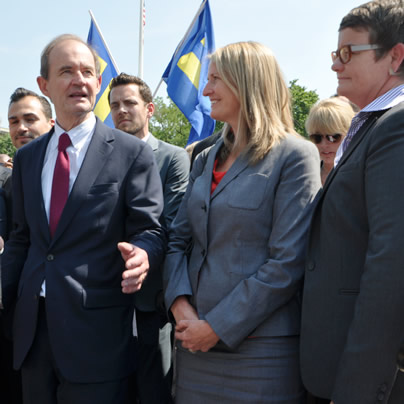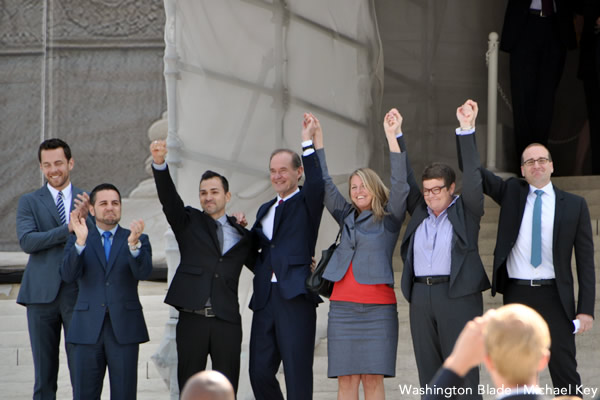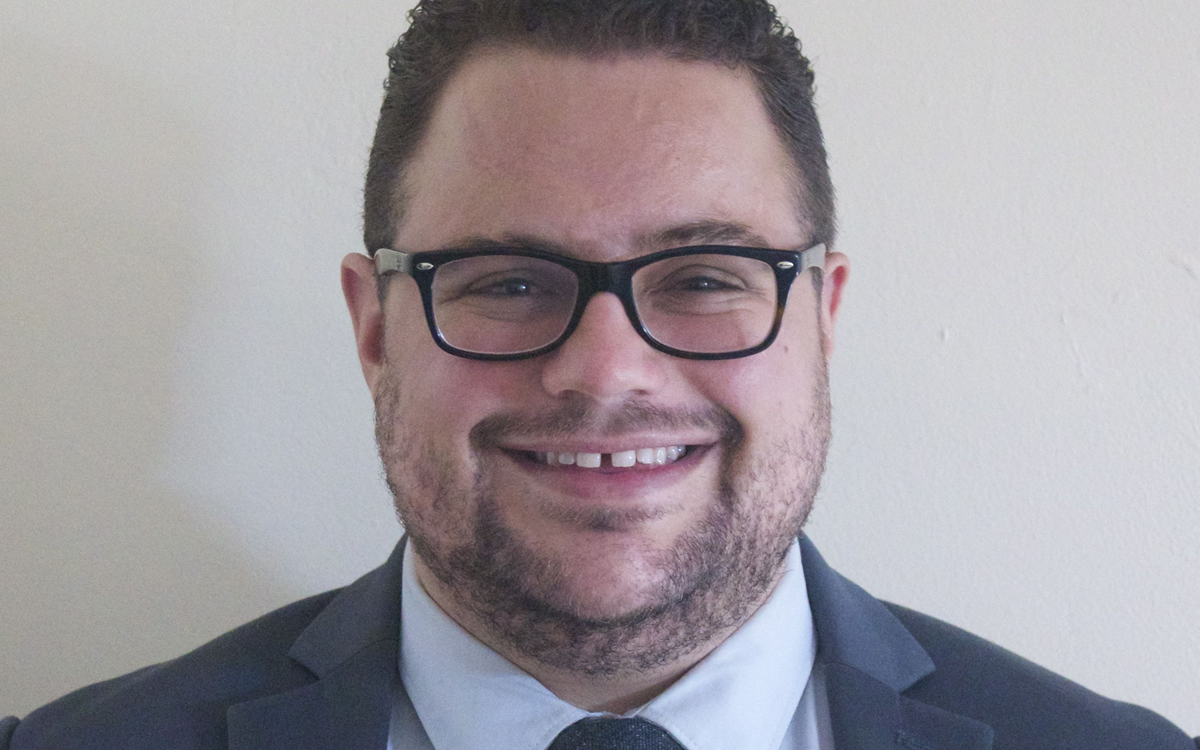National
Elated plaintiffs call court decisions victory for families
Gay couple in Prop 8 case invites Obama to upcoming wedding


HRC President Chad Griffin joined plaintiffs in the Prop 8 case on the Supreme Court steps Wednesday. (Washington Blade photo by Michael Key)
The lesbian and gay couples that served as the main plaintiffs in Wednesday’s historic Supreme Court decision overturning California’s Proposition 8 ban on same-sex marriage said the decision would have a profound positive impact on gay families in their home state and beyond.
California residents Kris Perry, after whom the case has been named, and her partner Sandy Stier told reporters and a crowd of onlookers outside the Supreme Court that the enormity of the legal ramifications of the case was for them overshadowed by its impact on their family, especially their four sons.
“Today is a great day for American children and families,” Perry told the gathering. “Sandy and I want to say how happy we are not only to be able to return to California and finally get married but to be able to say to the children in California, no matter where you live, no matter who your parents are, no matter what family you’re in, you are equal.”
Perry added, “And today we go back to California and say to our own children, all four of our boys – your family is just as good as everybody else’s family. We love you as much as anybody else’s parents love their kids. And now we’re going to be equal to every other family in California.”
Californians Jeff Zarrillo and his partner Paul Katami, the other couple that served as lead plaintiff’s in the Prop 8 case, told the gathering outside the Supreme Court that they, too, look forward to returning to their home state to get married.
“Prop 8 allowed us to turn our anger into action,” Katami told the gathering. “So although we celebrate today, we work to make sure that everyone like Jeff and I and Kris and Sandy can just get married because it’s the natural next step in our relationship,” he said.
“We want to join the institution of marriage not to take anything away but to strengthen it, to live up to its ideals.”
In a development that prompted both cheers and tears from onlookers, Katami turned to Zarrillo, his voice breaking, and said, “And today I finally get to look at the man I love and say, ‘Will you marry me?’”
With Zarrillo nodding in the affirmative, the two men kissed and embraced as news photographers TV camera crews recorded their action.
Following the two couples’ initial comments, which came at a news conference organized jointly by the Human Rights Campaign and the American Foundation for Equal Rights (AFER), which initiated the legal challenge to Prop 8 five years ago, the couples walked along the sidewalk outside the Supreme Court building speaking to individual television news outlets whose camera crews lined the sidewalk.
During one of those interviews, HRC President Chad Griffin, who accompanied the couples, excitedly informed them that President Obama just called Griffin’s cell phone from Air Force One, which was taking the president on a state visit to Africa.
Reporters and onlookers watched with interest as Griffin handed his cell phone to the couples, who spoke briefly with Obama.
“It’s incredible,” Griffin told reporters minutes later. “The president just called from Air Force One and he was thanking our team and the plaintiffs for their courage. And he said because of their courage thousands upon thousands of people will be able to join in the celebration of marriage very soon,” Griffin said.
Katami and Zarrillo told people standing near them that they thanked the president for calling them and invited him to their wedding.
“They’re quick,” observed attorney Theodore Boutrous, the law firm partner of lead plaintiff attorney Ted Olsen in the Prop 8 case. Olsen, who was in court on Wednesday in an unrelated case in Philadelphia, wasn’t able to attend the Supreme Court session announcing the Prop 8 decision.
“They get the president on the phone and they invite him to their wedding,” said Boutrous. “So it’s exciting. Not too many cases end with such a joyous thing, that people who want to get married can get married. This is a good one,” he said.
Perry told the Blade she, too, was excited to hear from Obama.
“When the leader of the free world tells a couple like Sandy and I that he respects our relationship and he hopes we can get married soon and show our kids that we’re a family, it says everything,” she said. “We couldn’t be prouder to have him call and tell us that.”
Fred Sainz, HRC’s vice president for communications, said Edith Windsor, 85, the lead plaintiff in the DOMA case, which bears her name, would be celebrating the decision in New York City. Windsor is a New York State resident who challenged DOMA in court following the death of her wife, whom she married in Canada, and the refusal of the IRS to waive her estate tax in the same way that tax is waived for opposite-sex married couples.
With DOMA overturned Wednesday by the Supreme Court, Windsor’s attorneys are expected to call on the IRS to retroactively refund the estate tax she was forced to pay.
Windsor was also scheduled to serve as a grand marshal in New York City’s LGBT Pride Parade this weekend.
U.S. Supreme Court
Supreme Court to hear Md. religious freedom case on Tuesday
Advocacy groups to rally outside during Mahmoud v. Taylor oral arguments

Activists on Tuesday will hold a rally in front of the U.S. Supreme Court as the justices hear oral arguments in a case that will determine whether schools are violating parents’ religious freedom by not letting them opt their children out of learning about LGBTQ-specific topics.
Mahmoud v. Taylor is a case out of Montgomery County about parents who wish to opt their children out of LGBTQ-themed lessons in public schools for religious reasons.
Montgomery County Public Schools, after initially allowing parents to opt their children out, changed the policy in March 2023.
The plaintiffs — Tamer Mahmoud, Enas Barakat, and other parents — argue “the storybooks were chosen to disrupt ‘cisnormativity’ and ‘either/or thinking’ among students.”
“The board’s own principals objected that the curriculum was ‘not appropriate for the intended age group,’ presented gender ideology as ‘fact,’ ‘sham[ed]’ students with contrary opinions, and was ‘dismissive of religious beliefs,’” according to the petition on the Supreme Court’s website.
The petition goes further, saying the parents are “not challenging the curriculum, but arguing that compelling their elementary-age children to participate in instruction contrary to their parents’ religious convictions violated the Free Exercise Clause. Construing Wisconsin v. Yoder, the 4th Circuit found no free-exercise burden because no one was forced ‘to change their religious beliefs or conduct.’”
The Coalition for Inclusive Schools and Communities, an organization that aims to bring together “advocates, educators, families, and organizations committed to inclusive, affirming, fact and science-based education,” will participate in the “Rally for Inclusive Education” rally outside the Supreme Court alongside Live In Your Truth and the Montgomery County Pride Family.
“Inclusive education isn’t just a value — it’s a necessity,” said Phillip Alexander Downie, co-chair of the Coalition for Inclusive Schools and Communities and CEO of Montgomery County Pride Family. “The right of every child to learn in an environment where they see themselves reflected, affirmed, and respected is under attack. This rally is our moment to protect that right — and ensure future generations inherit classrooms rooted in truth, equity, equality, and justice.”
The Coalition for Inclusive Schools and Communities says the rally is a “nonpartisan community gathering rooted in education, advocacy, and solidarity.”
“The focus of this event is to uplift the importance of inclusive learning environments, celebrate the power of diversity in our schools, and amplify the voices of those most impacted by exclusionary practices and rhetoric,” it said.
The rally will feature speakers from across the country, including students, educators, civil rights leaders, and authors who will give their own testimonies as to why it is important to have inclusivity in primary education. Trans Maryland, the National Women’s Law Center, MoCoPride Center, and Authors Against Book Bans are among the LGBTQ groups sponsoring the event.
National
EXCLUSIVE: Rodrigo Heng-Lehtinen to step down from Advocates for Trans Equality
A4TE formed last year when two transgender rights groups merged

Advocates for Trans Equality Executive Director Rodrigo Heng-Lehtinen on Monday announced he will step down on April 30.
The Transgender Legal Defense and Education Fund and the National Center for Transgender Equality formed Advocates for Trans Equality last year when they merged. Heng-Lehtinen was previously NCTE’s executive director.
“Now that we’ve made it through the merger, and A4TE is established as a new, prominent institution fighting hard for trans equality, it’s time for me to take my next step,” said Heng-Lehtinen in a press release that Advocates for Trans Equality sent exclusively to the Washington Blade. “When Andy (Hong Marra) and I began envisioning the merger, I committed to seeing it through. I’m proud that now our vision has been realized. A4TE has not just launched, but is fully up and running, delivering results for trans people around the country. With A4TE gaining momentum, I’m now ready to move on to my next chapter.”
Heng-Lehtinen, whose mother is former Florida Congresswoman Ileana Ros-Lehtinen, in the press release stressed he “will be focusing on changing hearts and minds.”
“With my background in persuasion and messaging, it’s where I can make the biggest difference, and what I feel called to return to in this era of anti-trans backlash,” said Heng-Lehtinen. “I will still be fighting shoulder-to-shoulder with everyone (in) the trans movement, simply in a different capacity.”
Marra, who is Advocates for Trans Equality’s CEO, praised Heng-Lehtinen and said the organization’s work will continue.
“We thank Rodrigo for his years of dedicated leadership and service,” said Marra. “A4TE will continue to deliver on our promise to advocate for the lives of trans people who need us now more than ever. We remain undaunted by our endeavor to ensure trans people and our families are no less than free and equal and treated with dignity and respect.”
Louisiana Trans Advocates Executive Director Peyton Rose Michelle also praised Heng-Lehtinen.
“Rodrigo has been a steady hand and a bright light in this work,” she said. “He’s someone who shows up with integrity, kindness, and a deep commitment to meeting this political moment with courage. I’ve always felt deeply supported and heard by him, which is something I value deeply.”
“I fully support him as he steps into this new chapter, and I know his clarity of vision and heart-forward leadership will keep shifting this landscape back toward justice for trans people, and therefore, all people,” added Michelle.
U.S. Federal Courts
Federal judge blocks Trump passport executive order
State Department can no longer issue travel documents with ‘X’ gender markers

A federal judge on Friday ruled in favor of a group of transgender and nonbinary people who have filed a lawsuit against President Donald Trump’s executive order that bans the State Department from issuing passports with “X” gender markers.
The Associated Press notes U.S. District Judge Julia Kobick in Boston issued a preliminary injunction against the directive. The American Civil Liberties Union, which represents the plaintiffs, in a press release notes Kobick concluded Trump’s executive order “is likely unconstitutional and in violation of the law.”
“The preliminary injunction requires the State Department to allow six transgender and nonbinary people to obtain passports with sex designations consistent with their gender identity while the lawsuit proceeds,” notes the ACLU. “Though today’s court order applies only to six of the plaintiffs in the case, the plaintiffs plan to quickly file a motion asking the court to certify a class of people affected by the State Department policy and to extend the preliminary injunction to that entire class.”
Former Secretary of State Antony Blinken in June 2021 announced the State Department would begin to issue gender-neutral passports and documents for American citizens who were born overseas.
Dana Zzyym, an intersex U.S. Navy veteran who identifies as nonbinary, in 2015 filed a federal lawsuit against the State Department after it denied their application for a passport with an “X” gender marker. Zzyym in October 2021 received the first gender-neutral American passport.
The State Department policy took effect on April 11, 2022. Trump signed his executive order shortly after he took office in January.
Germany, Denmark, Finland, and the Netherlands are among the countries that have issued travel advisories for trans and nonbinary people who plan to visit the U.S.
“This ruling affirms the inherent dignity of our clients, acknowledging the immediate and profound negative impact that the Trump administration’s passport policy would have on their ability to travel for work, school, and family,” said ACLU of Massachusetts Legal Director Jessie Rossman after Kobick issued her ruling.
“By forcing people to carry documents that directly contradict their identities, the Trump administration is attacking the very foundations of our right to privacy and the freedom to be ourselves,” added Rossman. “We will continue to fight to rescind this unlawful policy for everyone so that no one is placed in this untenable and unsafe position.”
-

 State Department4 days ago
State Department4 days agoHIV/AIDS activists protest at State Department, demand full PEPFAR funding restoration
-

 Brazil5 days ago
Brazil5 days agoUS lists transgender Brazilian congresswoman’s gender as ‘male’ on visa
-

 District of Columbia4 days ago
District of Columbia4 days agoCapital Pride wins $900,000 D.C. grant to support WorldPride
-

 Obituary3 days ago
Obituary3 days agoLocal attorney, LGBTQ rights advocate Dale Sanders dies at 75











